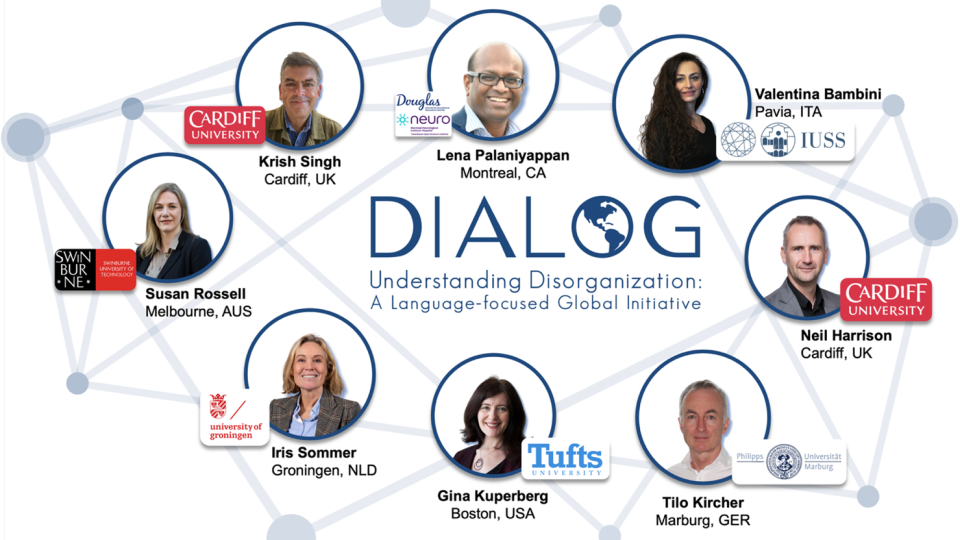
What happens to language when the mind falls ill? Why does thought become disorganized in some individuals with psychiatric disorders to the point of impairing their ability to communicate? Exploring these phenomena not only improves diagnostic tools but also helps break down the barriers of misunderstanding and stigma surrounding mental suffering.
This is the mission behind DIALOG – Understanding Disorganisation: A Language-focused Global Initiative in Psychosis, an international research project funded with approximately €6 million by the Wellcome Trust, one of the world’s most prestigious biomedical research foundations. The project is led by psychiatrist Lena Palaniyappan, professor at McGill University and researcher at the Douglas Mental Health University Institute in Montréal.
Among the project partners is the Scuola Universitaria Superiore IUSS of Pavia, which brings strong expertise in neurolinguistics and communication pragmatics.
At the heart of the project is language disorganization, a common symptom in many psychiatric disorders that hinders relationships, fuels isolation, and worsens individual distress. DIALOG aims to investigate this disorganization through an integrated approach that combines linguistic, computational, neurobiological, and rehabilitative methods, involving a sample of over 3,000 individuals affected by psychosis.
“Our ultimate goal is to more accurately identify treatment targets to genuinely improve people’s daily lives,” says Prof. Palaniyappan. “This is one of the first attempts in psychiatry to develop clinical trials focused on a symptom—disorganized thought and language—rather than on a diagnosis.”
The project takes an interdisciplinary and inclusive approach: in addition to world-renowned scholars, the team includes two individuals with lived experience of mental illness and one artist skilled in visually representing illness experiences, bringing the subjective and social dimensions of mental distress into the research.
The contribution of IUSS Pavia is led by Prof. Valentina Bambini, professor of Linguistics and head of the Laboratory of Neurolinguistics and Experimental Pragmatics (NEPLab).
The IUSS research group will focus specifically on developing a communication-based rehabilitative intervention, with a core emphasis on enhancing sensitivity to the linguistic and psychological context of social interactions. In conducting the research, NEPLab will leverage an established network of excellence, including collaboration with Prof. Marta Bosia at the San Raffaele Scientific Institute in Milan.
“IUSS’s participation in DIALOG builds on our long-standing tradition of research on language and reflects the School’s commitment to high-impact, interdisciplinary, and person-centered research,” explains Prof. Bambini. “Studying language disorganization in psychosis not only deepens our understanding of language—a cognitive faculty which makes us human—but also moves us closer to the goal of restoring voice to those facing communication difficulties.”
DIALOG also supports the involvement of early-career researchers, including Dr. Federico Frau from NEPLab, who comments:
“DIALOG is a major opportunity for scientific growth and, more importantly, for advanced training in a top-tier academic environment that fosters multidisciplinary collaboration.”
The project is led by a distinguished team of researchers from seven countries:
Lena Palaniyappan (Douglas Institute – McGill University, Canada),
Valentina Bambini (Scuola Universitaria Superiore IUSS, Italy),
Neil Harrison (Cardiff University, UK),
Tilo Kircher (Philipps-Universität Marburg, Germany),
Gina Kuperberg (Tufts University, USA),
Susan Rossell (Swinburne University of Technology, Australia),
Krish Singh (Cardiff University, UK),
Iris Sommer (University Medical Center Groningen, The Netherlands).
With this global network, DIALOG is laying the groundwork for an unprecedented international synergy to rethink the relationship between language and mental health, with the ambition of creating new tools to improve care quality worldwide.